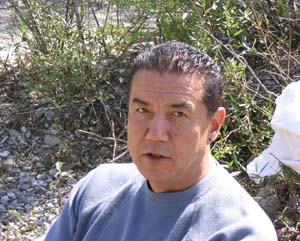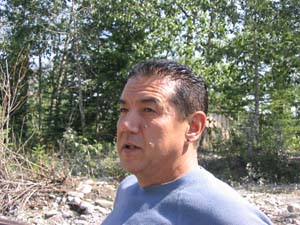
Whether working for the future of Lynx River as Peter Kenidi,
or for the future of less-fortunate Canadians as himself, Tom
Jackson is always on the go. In this all-too-brief chat
during
the filming of "Distant Drumming," I had just a few minutes
to catch up with him about his most recent charitable activities
and the new movie. Nof60 publicist Fran Humphreys was
also with us.
PW: There was an article in the Calgary Herald the other day that mentioned a benefit you're doing for the beef producers in Alberta, and also a low-cost housing project. Could you fill us in on both of those projects?
TJ: The fundraiser for the cattlemen's association will be a concert and a tailgate party, an event that will invite 10,000 vehicles for a tailgate barbeque. [Note: The concert was later changed to a beef sale benefiting Alberta food banks.]

|
PW: And what's Earthcel all about?
TJ: Earthcel is a building technology. I did research for 3-1/2 years trying to find solutions to the affordable housing issue. I was so enamored of one of those solutions that I bought it.
PW: Is it a rammed-earth technology, or what?
TJ: It's steel-stud homes with expanded polystyrene insulation.
PW: So you bought the company?
TJ: Basically, I bought the technology.
PW: And was that something developed in Canada?
TJ: I'm not at liberty to say, but it's not from this continent, I can tell you that.
PW: Did this happen recently?
TJ: Yes, within the last six months. There's a technical institute, a school here that's going to institute it as part of their curriculum. They're going to train their students in this technology. Because it's more than just a building; it's a whole new application. We basically take your home, put it in a computer, and our computer and our system will cut your home out in panels. Then we'll ship it to the site in a bale, and we'll put it together like a Lego set. I can actually build a 1,200-square foot home, block up the walls, in 12 hours. I can work under a roof in 12 hours.
PW: What's the exterior material?
TJ: It can be whatever paneling or siding you want. But you don't have to; you could put stucco right onto the polystyrene.
PW: Well, there's so much I could ask you about Peter Kenidi, but I know we don't have much time. So maybe you could bring us up to date. I assume he's still an MLA in Yellowknife, but I guess in "Distant Drumming" he's back in Lynx River for a visit?
TJ: Peter's maybe home for a visit and gets caught up in the issues of the day, but he's balancing his relationship with the characters who live in Lynx River. The linear meets the non-linear. The non-linear relationship with Michelle and his family and all the right that they exhibit, versus the linear which is his relationship with Teevee and his new administration and his policies that he works within. Someone suggested that those policies may be compromised, somewhat corrupt.
At the same time, well placed just below the surface so it's not that obvious. And his relationship with his family, mainly Michelle. She's caught between her professional world--which is that of being an RCMP officer--and the possibility that her son may be involved with part of this skullduggery in Lynx River.

|
PW: With Matthew Fowler coming into town and another death? Speaking of which, as MLA, is there anything you can do about the disturbing increase in the number of murders in Lynx River over the past few years? [all laugh]
FH: We'd all be out of work!
PW: Good point! On second thought, don't do anything about it! Has anyone even noticed it, though?
TJ: Well, part of the life of "North of 60" has been the brilliance of how it has been placed within the broadcast industry here. Because we work in a subsidized industry, the longer a series goes on, the less subsidy it gets. So what that means in terms of the scale of success is that with a commercial venture, the more successful a series is, the more money you would get. So in our world, as actors, we may be more successful and asking for more but there's actually less funds coming in.
Having said that, the genius of the producers of "North of 60" is finding the slot in our public television world where there's funding for movie-of-the-week mysteries. So consequently, our plots have to have a mystery quality. So that brings all sorts of other possibilities, but the most accessible one, obviously, is our life-and-death scenarios. Thus the body count in "North of 60"!
But at the same time, along with that, you're still afforded a look in a window into a community that you wouldn't normally get to see. And the richness of the characters. I think there's a real truth in the characters and the lifestyle and the makeup of the people who live in the isolation of the north--which is a beautiful, wonderful place, as are the people who live there.
PW: I'm staying with a woman who has spent a lot of time in the north, and she's reiterated what I've heard before: that a lot of small northern towns would just close down on Thursday nights to watch the show. And that people thought it was very realistic, that it had a lot of integrity.
TJ: It does have that integrity. One of the sad facts of a lot of northern native community is the fact that the death rate in most of the communities is appalling, it's just absolutely appalling. A lot of them by suicide; a lot of them young people. Yeah, the body count in "North of 60" may feel like it's high, but in northern communities, it is like that in a lot of ways. Myself, along with Tina and a number of other people who have been educated through this series, have taken on the cause of trying to create a better quality of life for the people who live in the north.
I myself am going into 26--maybe 27--communities early next year, in the winter, with the grace of sponsorship that's offered up by First Air, which flies all over the north. When you do this kind of work outside of the film industry, one of the biggest hurdles is transportation. You can volunteer yourself and do all sorts of things by the nature of goodwill, but if you can't get to the spot you're really hoped. But First Air, which is a First Nations-owned airline in the north, has offered up a sponsorship.
PW: Is this the Dreamcatcher tour coming back again?
TJ: That's correct, it is. As a matter of fact, I'm going out at the end of September, and then I'm going to go out again in late winter/early spring. We're doing concerts and running workshops with students on preventing suicide. And we're also doing workshops on FAS [fetal alcohol syndrome] with caregivers. The thing we're doing in September is in the prairies and western Canada, then the other one is going up north.
PW: Tom, I know you have to run, so thank you very much. I'll keep everyone posted about your activities.
Click here to see and hear a video greeting from Tom.]
(c) 2003 Patricia F. Winter
Updated 5/18/2007
All rights reserved. For personal use only. Do not distribute to other persons by electronic or non-electronic means (including posting on a web site) without prior permission from the copyright owner.
Last updated 6/19/09